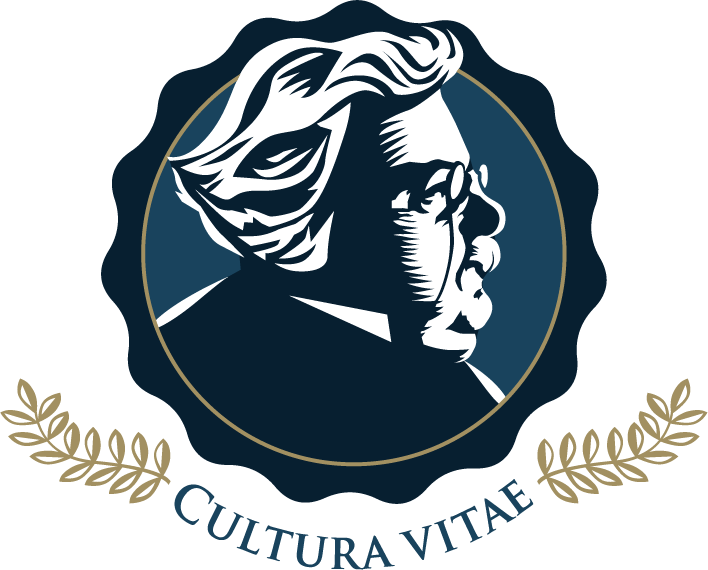A Vision for Christian Renewal
“I want Catholics to see that poetry and the arts fit into our great conversation, our communion, with God.”
There is a two-way movement, through man, between the divine and the temporal realm. Plato posited the decisive, active, initial aspect of that movement from the divine: inward, in and through real things, the Ideals push into manifestation, or realization in the material world. The Incarnation opened the way to a further comprehension of reality as coming to fulfillment through the Imago Dei – Christ in human beings awakened to newness of life by His presence.
Ideals so easily become idols, and ideas idea-olatry, that God turned His chosen people firmly away from the inherent human capacity to perceive His glory through the created world (what Owen Barfield calls man’s “original participation” in reality). With his fall, man stepped down as the world’s knower-and-namer, affecting reality itself by his darkness. Without the receptive light of man’s beholding, Creation itself was left groaning. Only in Christ was this capacity, this correspondence to the glory of God, restored. The Church is the locus of the possibility of personhood – human beings birthed anew and restored through Sacrament and sacramental vision. The New Man is meant to participate in the Spirit’s renewal of the world by virtue of this Christ-filled, Church-embedded renascence.
The Western tradition conservatives ought to be fighting to conserve (safeguard, teach, build upon) is based upon the Platonic insight that the intelligibility of the world corresponds to man’s being, and vice versa. His hunger to know is met by an entire banquet that calls to him through Creation. The Western tradition is rooted in the story told by Christianity, and thus is ‘literary,’ rather than abstract from any narrative. The Christian mythos, though, has gradually been divorced from the logos of reason, science, and philosophy. Without that literary integration with the highest/deepest ground of reality, man himself – in his own reason, in reductionist scientism, and in his culture – deteriorates.
Christian Platonists, informed by an understanding of man as designed for a destiny of participation in the interior life of the Trinity – for correspondence to the Truth, Beauty, and Goodness of God – recognize that man’s highest activity is to receive (perceive, contemplate, appropriate) the splendor of God’s glory. “…the human person’s intellectual nature [is] fulfilled in the soul’s vision of truth-in-beauty”.(Vision, 100) By this ‘sight,’ the soul perceives “the nature of the person, the nature of beings, …and the character of reality…as an ordered whole of form and splendor brought into being by the divine Beauty, God himself.”(Vision, 101) In The Vision of the Soul, James Matthew Wilson offers Christian Platonism as a timely and much-needed corrective to a conservatism which has awakened, late, “to the need to cultivate and inform a culture rather than merely rail against its malformations.”(Vision, 116)
Like Gregory Wolfe, in Beauty Will Save the World, Wilson observes that conservatives have appreciated the arts as noble and praiseworthy, but not appreciated the central role of making art. “They have admired the beauty of only those artworks that seem most readily translatable into the language of politics and morality, and have left neglected both the more difficult beauties of the fine arts and the more accessible beauties attainable in popular arts and mass culture. They have thus been derelict in their duty to sow in our culture new stories, new works, new images….”(Vision,124)
James Bryson – in a highly positive review of The Vision of the Soul – calls Christian Platonism “a middle way, not a triumphalist way” that will enable believers to both differentiate the Good News from the many flawed philosophies Wilson critiques, and to find our common ground with our contemporaries who question the post-Enlightenment logos, but have not yet found their way back to the ultimate mythos represented by the Church. That “Christian Platonists can turn seeming antagonists into conversation partners or even allies…is, or ought to be, one of our great strengths.”(Bryson) Reason depends upon both the rational (logical, analytical) and pre-rational (intuitive, poetical) engagement with reality. Man’s growth depends upon a re-integration of the two in an intellect made whole by Christ.
If, without realizing it, “we have formed our own pre-rational sensibilities on the irrelevance of stories to rational thought, and on the irrelevance of reasoning to the narrative form of human life, then we risk making ourselves unwittingly insensible to a reality on which our happiness fundamentally depends.”(Vision,325) Poetry (story-telling) has been marginalized in the modern world, and man with it. As “the seed that grows into the life of reason and virtue,” poetry is a critical component of intellectual development – “a necessary oasis for those who wish to discover the riches of the intellectual life.”(Vision,337) The impoverished people in the world around us have not heard the news that their inherent yearning for Truth, Beauty and Goodness corresponds to “the ordered fabric of the cosmos itself.” (Vision,338) To rescue the perishing, we must know man better than he knows himself.
Educators, artists, parents, students, evangelists, and those pursuing the cultivation of their own lively minds will find James Matthew Wilson speaks directly to the project of intellectual renewal so much needed in our world today. His desire is to defend the Christian Platonist conception of the well-lived human life, argue for a rich metaphysics of beauty, and “explain the role of the arts in the sustenance of human culture”(Vision,33)
What questions do these thoughts raise in you? Please come hear this author speak on September 19, and ask those questions yourself!
Register for free tickets today!
Vision: The Vision of the Soul, by James Matthew Wilson
Bryson: “A Vision of Christian Platonism,” by James Bryson (In The North American Anglican, 9/29/20)
